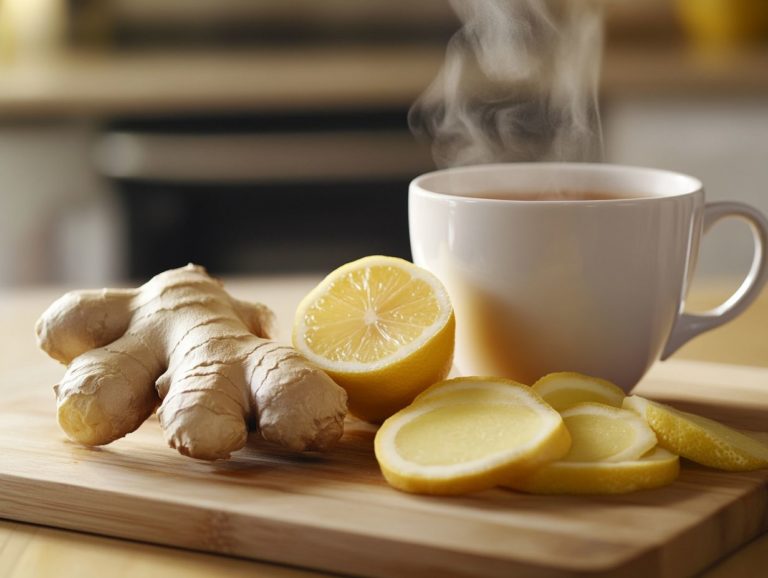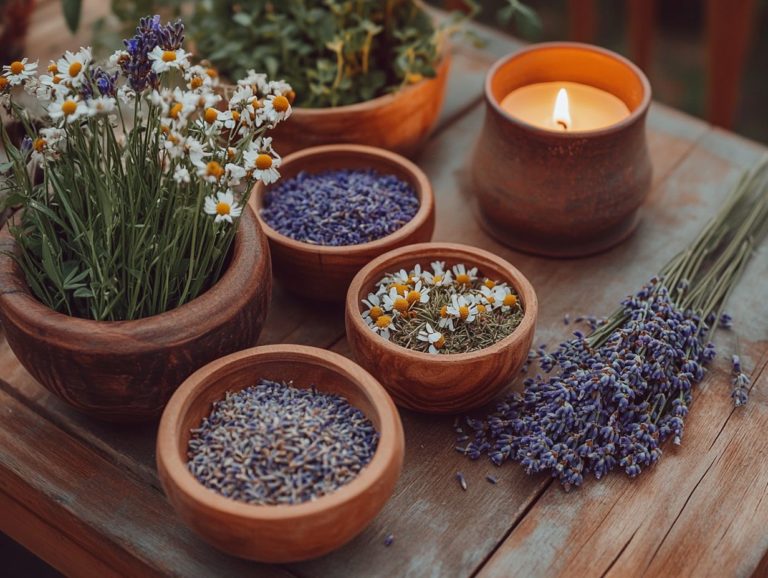5 Essential Oils Derived from Herbs
Essential oils have skyrocketed in popularity, celebrated for their myriad benefits and versatile applications. From the soothing embrace of lavender to the refreshing zing of peppermint, these extracts are sourced from nature’s most aromatic herbs.
In this article, you ll delve into five essential oils lavender, peppermint, rosemary, eucalyptus, and tea tree exploring their distinctive properties, health advantages, and clever ways to weave them into your daily routine. You’ll also uncover common myths, learn about extraction methods, and arm yourself with essential oil safety tips. Get ready to unlock the secrets of these natural wonders that can transform your well-being!
Contents
- Key Takeaways:
- 1. Lavender Essential Oil
- 2. Peppermint Essential Oil
- 3. Rosemary Essential Oil
- 4. Eucalyptus Essential Oil
- 5. Tea Tree Essential Oil
- What Are Essential Oils and How Are They Derived from Herbs?
- What Are the Health Benefits of Lavender Essential Oil?
- How Can Peppermint Essential Oil Be Used for Aromatherapy?
- What Are the Uses of Rosemary Essential Oil in Traditional Medicine?
- How Can Eucalyptus Essential Oil Help with Respiratory Issues?
- What Are the Antimicrobial Properties of Tea Tree Essential Oil?
- What Are the Precautions to Take When Using Essential Oils?
- How Can Essential Oils Be Incorporated into Daily Life?
- What Are Some Common Myths About Essential Oils?
- What Are the Different Methods of Extracting Essential Oils from Herbs?
- What Are Some Other Essential Oils Derived from Herbs?
- How Can Essential Oils Be Used in Natural Cleaning and Skincare Products?
- What Are Some Tips for Choosing High-Quality Essential Oils?
- Are There Any Side Effects of Using Essential Oils?
- What Are Some Ways to Store and Preserve Essential Oils?
- Frequently Asked Questions
- 1. What are the benefits of using essential oils derived from herbs?
- 2. Which herbs are commonly used to make essential oils?
- 3. How are essential oils derived from herbs?
- 4. How can essential oils derived from herbs be used?
- 5. Are there any safety precautions when using essential oils derived from herbs?
- 6. Can essential oils derived from herbs be harmful?
Key Takeaways:
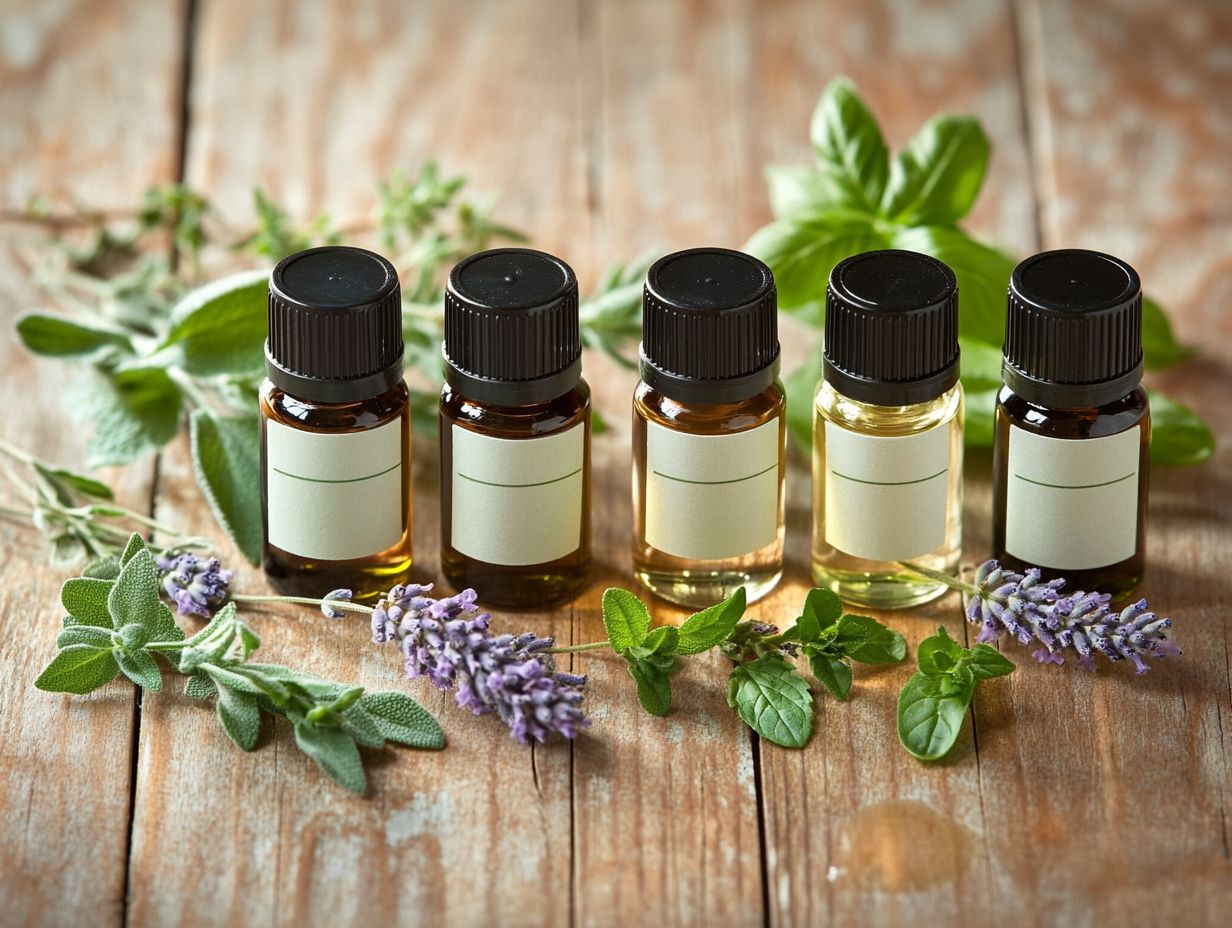
- Lavender essential oil has numerous health benefits, including promoting relaxation and improving sleep quality.
- Peppermint essential oil is commonly used in aromatherapy to help alleviate headaches and improve mental clarity.
- Eucalyptus essential oil is known for its respiratory benefits and can help clear congestion and promote easier breathing.
1. Lavender Essential Oil
Lavender essential oil, derived from the aromatic lavender plant, is truly celebrated for its therapeutic benefits in aromatherapy and herbal medicine. Its impressive qualities include antiseptic properties and effectiveness as a natural pesticide, making it a versatile choice for both health and household applications.
To extract this remarkable oil, two prevalent methods come into play: steam distillation and solvent extraction. Steam distillation is preferred because it maintains the oil’s purity. In this method, steam is passed through lavender flowers to gather their oils. Solvent extraction uses solvents to dissolve essential compounds, creating a concentrated product from the flowers.
When you use lavender essential oil, you can enjoy its calming effects, promoting relaxation and alleviating stress. It s essential to exercise caution, as some individuals may experience skin irritation or allergic reactions with topical application. Conducting a patch test before widespread use is vital for a delightful and safe experience.
2. Peppermint Essential Oil
Peppermint essential oil, abundant in menthol, is a remarkable oil celebrated for its therapeutic benefits. It enhances flavors in food, supports digestive health, and serves as an effective natural pesticide.
The extraction of this aromatic oil primarily employs steam distillation, a method that captures its essential compounds while maintaining their integrity. CO2 extraction is another technique that delivers a richer array of the plant’s properties. Both methods ensure the oil’s potency, rendering it suitable for various aromatherapy uses, where it can help alleviate headaches and boost mental clarity.
You might also discover potential health benefits, such as relief from respiratory issues and muscle tension. However, it s crucial to adhere to safety standards and precautions, as concentrated forms can lead to skin irritation or adverse reactions if not used properly.
3. Rosemary Essential Oil
Rosemary essential oil, derived from the fragrant rosemary plant, is celebrated not only for its culinary applications but also for its remarkable therapeutic benefits. Known for its antioxidant properties and ability to enhance cognitive function, it has become a staple in both gourmet cooking and herbal remedies.
The oil is primarily extracted through the steam distillation method, a process that carefully preserves its potent qualities. In this method, steam is used to extract the oil from the plant’s delicate leaves, allowing it to maintain its rich flavor and numerous health benefits.
In culinary arts, rosemary essential oil is a wonderful addition to various dishes, elevating flavors while providing impressive health advantages. Its abundant antioxidants may offer protection against oxidative stress. In aromatherapy, this essential oil is often used to potentially uplift mood, alleviate stress, and support mental clarity, making it invaluable in both culinary creations and wellness practices.
Safety Tips: Always conduct a patch test before using essential oils on your skin. Store oils in a cool, dark place to maintain their potency. Use caution and consult with a healthcare professional if you are pregnant, nursing, or have existing health concerns.
Why wait? Explore these essential oils today and enhance your life naturally!
4. Eucalyptus Essential Oil
Unlock the secrets of eucalyptus essential oil! This powerful remedy can transform your wellness routine. Derived from the leaves of the eucalyptus tree, it is a treasure in the realm of aromatherapy.
Its potent antimicrobial properties and effectiveness in alleviating respiratory issues make it a favored option for those seeking natural remedies.
The distillation of this essential oil typically employs steam distillation. In this process, steam permeates the plant material, vaporizing the delicate volatile compounds. As the steam cools, these vapors condense back into liquid form, elegantly separating the essential oil from water and other residues.
Renowned for its ability to ease congestion, eucalyptus oil works wonders in treating colds, allergies, and sinusitis. Its antiseptic properties give it the power to combat infections and foster healing.
However, it’s vital to remember that some individuals may experience skin irritation when applying it topically. Conducting a patch test beforehand is a wise precaution.
5. Tea Tree Essential Oil
Tea tree essential oil, extracted from the leaves of the Melaleuca alternifolia tree, is celebrated for its powerful antibacterial properties. It s no wonder it s a go-to for treating skin irritation and even serves as a natural pesticide in herbal medicine.
The extraction process uses steam distillation. This method preserves the oil’s potent active compounds, resulting in a concentrated essence that can be used across various applications.
Regarding skincare, tea tree oil shines, especially for those grappling with acne and other skin issues. Its ability to fight bacteria and reduce inflammation makes it a favorite among users looking to soothe redness and stave off breakouts.
Prioritizing safety is important, as topical application might occasionally trigger allergic reactions or irritation.
Before fully integrating tea tree oil into your skincare routine, conduct a patch test to ensure it works harmoniously with your skin. Experience the benefits today!
What Are Essential Oils and How Are They Derived from Herbs?
Essential oils are concentrated water-repellent liquids derived from aromatic plants, capturing the essence of the plant’s fragrance and therapeutic properties through compounds that easily evaporate.
These oils play an important role in your wellness journey, offering a wide array of health benefits from alleviating stress to enhancing skin conditions.
Their significance transcends mere delightful scents; they hold profound therapeutic potential to support both emotional and physical well-being.
Different extraction techniques can significantly impact the oils you choose. For instance, steam distillation involves immersing plant material in steam, separating the oils through condensation.
Solvent extraction employs chemical solvents to dissolve oils, yielding a richer essence that may also come with potential impurities. CO2 extraction utilizes carbon dioxide under high pressure, preserving the integrity and chemical composition of the oil.
This results in a purer and more potent product. Understanding these methods enriches your appreciation for the quality and efficacy of the essential oils available in your wellness practices.
What Are the Health Benefits of Lavender Essential Oil?
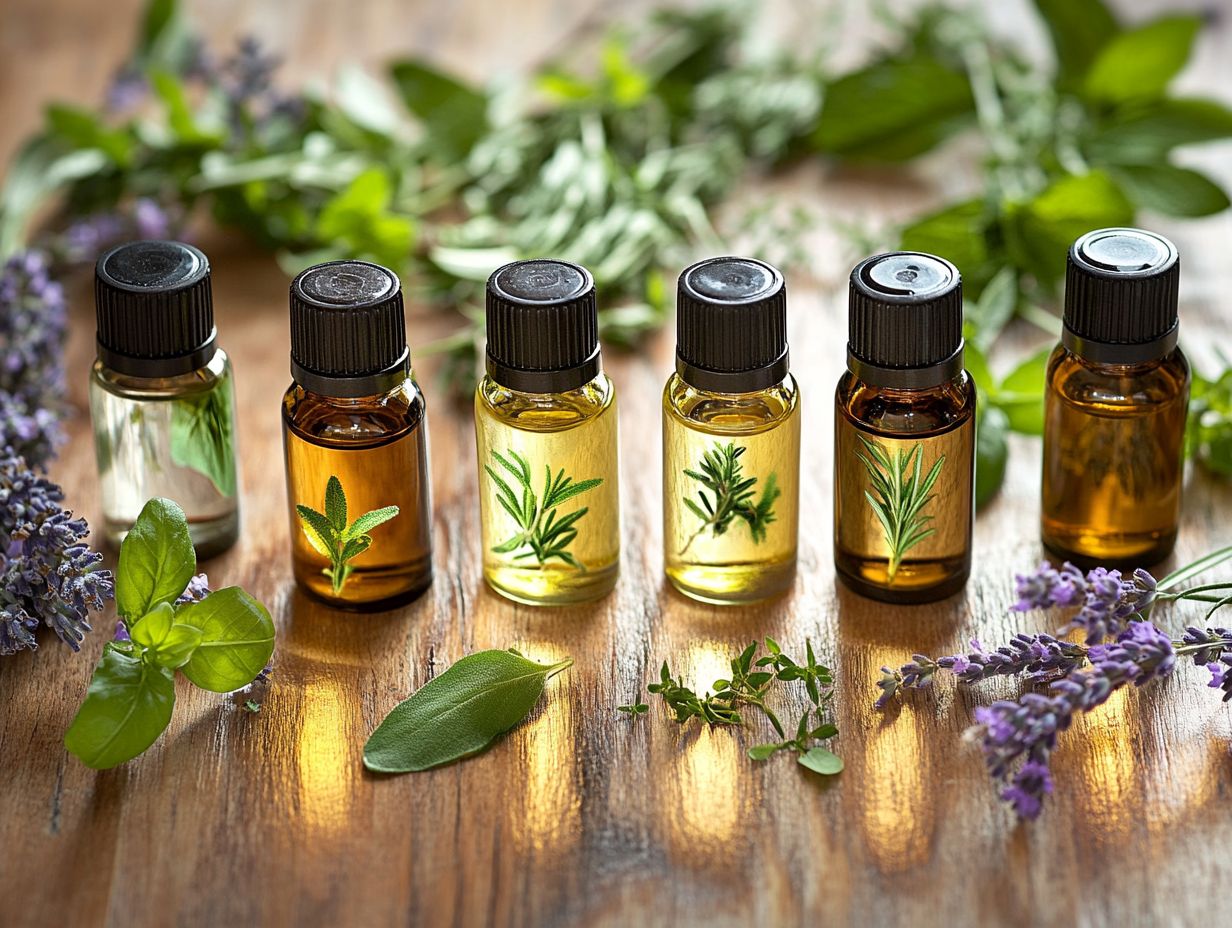
Lavender essential oil stands out for its remarkable therapeutic benefits, notably its calming effects on the mind, ability to soothe skin irritation, and antioxidant properties. This makes it a favored choice in both aromatherapy and skincare.
You ll find this versatile oil particularly effective in reducing anxiety and enhancing sleep quality. Many individuals have discovered the secret to a more restful night s sleep and a calmer mindset throughout the day thanks to its soothing qualities.
It s common to incorporate lavender into bedtime routines whether by diffusing the oil or applying it topically to create a tranquil environment.
However, it s important to remember that some people may experience side effects, such as allergic reactions or skin irritations. To ensure your safety, it s wise to conduct a patch test before diving in.
Always follow recommended dilution practices when applying lavender essential oil to your skin. Experience the calming benefits of lavender oil today!
How Can Peppermint Essential Oil Be Used for Aromatherapy?
Peppermint essential oil is a remarkable addition to your wellness toolkit and is popular in aromatherapy for its therapeutic benefits. It can help relieve headaches and digestive issues. Plus, it offers a refreshing scent that enhances the flavor of your culinary creations.
To fully embrace the potent properties of peppermint essential oil, consider diffusing it in your space. This simple act can transform your surroundings into an invigorating atmosphere that sharpens clarity and enhances focus.
Alternatively, you might explore topical application just remember to dilute it with a base oil used to dilute essential oils first. This method allows you to reap direct benefits on your skin, potentially easing tension and reducing inflammation.
Exercise caution, though, as some individuals may experience sensitivity or irritation. A patch test is a wise step before applying it to larger areas. By incorporating both diffusion and topical use, peppermint becomes a cornerstone of your aromatherapy practices, delivering both mental clarity and physical relief.
What Are the Uses of Rosemary Essential Oil in Traditional Medicine?
Rosemary essential oil boasts a rich history in traditional medicine, cherished for its therapeutic benefits that enhance memory and concentration. It’s also a delightful ingredient in culinary creations, showcasing its remarkable versatility.
This oil has been praised for its ability to stimulate cognitive functions. Ancient civilizations relied on it to boost memory during studies and important ceremonies. Rosemary also supports digestion effectively, addressing issues like bloating and indigestion, which firmly establishes it as a cornerstone in herbal remedies.
In contemporary practices, this essential oil finds its way into aromatherapy and wellness products, fostering mental clarity and emotional balance. However, it’s essential to heed safety guidelines, as excessive use can lead to unwanted side effects. Embracing moderation is vital to fully reap its profound benefits.
How Can Eucalyptus Essential Oil Help with Respiratory Issues?
Eucalyptus essential oil can work wonders for respiratory issues! With its antimicrobial properties and efficacy in clearing airways, it has become a favored option for natural remedies in the realm of aromatherapy.
To experience relief, you might find inhalation particularly effective. Simply add a few drops of eucalyptus oil to a bowl of hot water and take deep breaths of the steam. Alternatively, you can dilute it with a base oil used to dilute essential oils and apply it topically to your chest or back, enhancing your respiratory comfort.
While eucalyptus oil is generally safe for most, it’s essential to follow the recommended guidelines and conduct a patch test to avoid any skin irritation. If you are pregnant, nursing, or have specific health concerns, consulting a healthcare professional before adding this essential oil to your routine is a wise choice.
What Are the Antimicrobial Properties of Tea Tree Essential Oil?
Tea tree essential oil is celebrated for its powerful antimicrobial properties, making it an effective ally against various pathogens. It serves as an invaluable asset in skincare, particularly for treating skin irritation and in natural pesticide formulations.
Research underscores its ability to combat bacteria, fungi, and even certain viruses, establishing it as a versatile option in holistic health and wellness. A study published in the Journal of Antimicrobial Chemotherapy emphasized its effectiveness against Staphylococcus aureus, a common and resistant strain of bacteria.
Don’t miss out on its amazing benefits! While the benefits are impressive, it’s essential to adhere to safe usage guidelines. Diluting the oil before applying it topically is a must to minimize irritation. If you have sensitive skin, be sure to conduct a patch test first, as allergic reactions, though rare, can occur.
What Are the Precautions to Take When Using Essential Oils?
When using essential oils, it s crucial to take specific precautions to prevent skin irritation and allergic reactions. Being aware of potential toxicity, especially with concentrated products, is key.
One effective way to ensure safety is to follow proper dilution guidelines. Always dilute essential oils with a carrier oil before applying them directly to your skin. Do a patch test to identify any adverse reactions before diving deeper into using the oils.
If you have specific allergies, avoid certain oils that might aggravate your condition, such as cinnamon or peppermint for those with related plant allergies. Gradually incorporate essential oils into your daily routine. Whether you’re adding them to a diffuser, mixing them into a bath, or blending them into homemade skincare products, this approach makes using them safer and more enjoyable.
How Can Essential Oils Be Incorporated into Daily Life?
Essential oils can effortlessly become part of your daily life through various applications, such as aromatherapy, natural cleaning products, and enhancing food flavors, all while improving your health and home environment.
Picture yourself using a diffuser to fill your space with calming lavender or zesty citrus scents. This can promote relaxation or boost your energy levels as needed. If you’re inclined toward eco-friendly cleaning, add oils like tea tree or eucalyptus into your homemade cleaners. They not only eliminate germs but also leave your home smelling delightful.
In the kitchen, oils such as peppermint or lemon can elevate your culinary creations, adding distinctive flavors to both dishes and beverages.
These diverse applications show how essential oils can be seamlessly woven into your everyday routines, benefiting both your physical and mental well-being.
What Are Some Common Myths About Essential Oils?
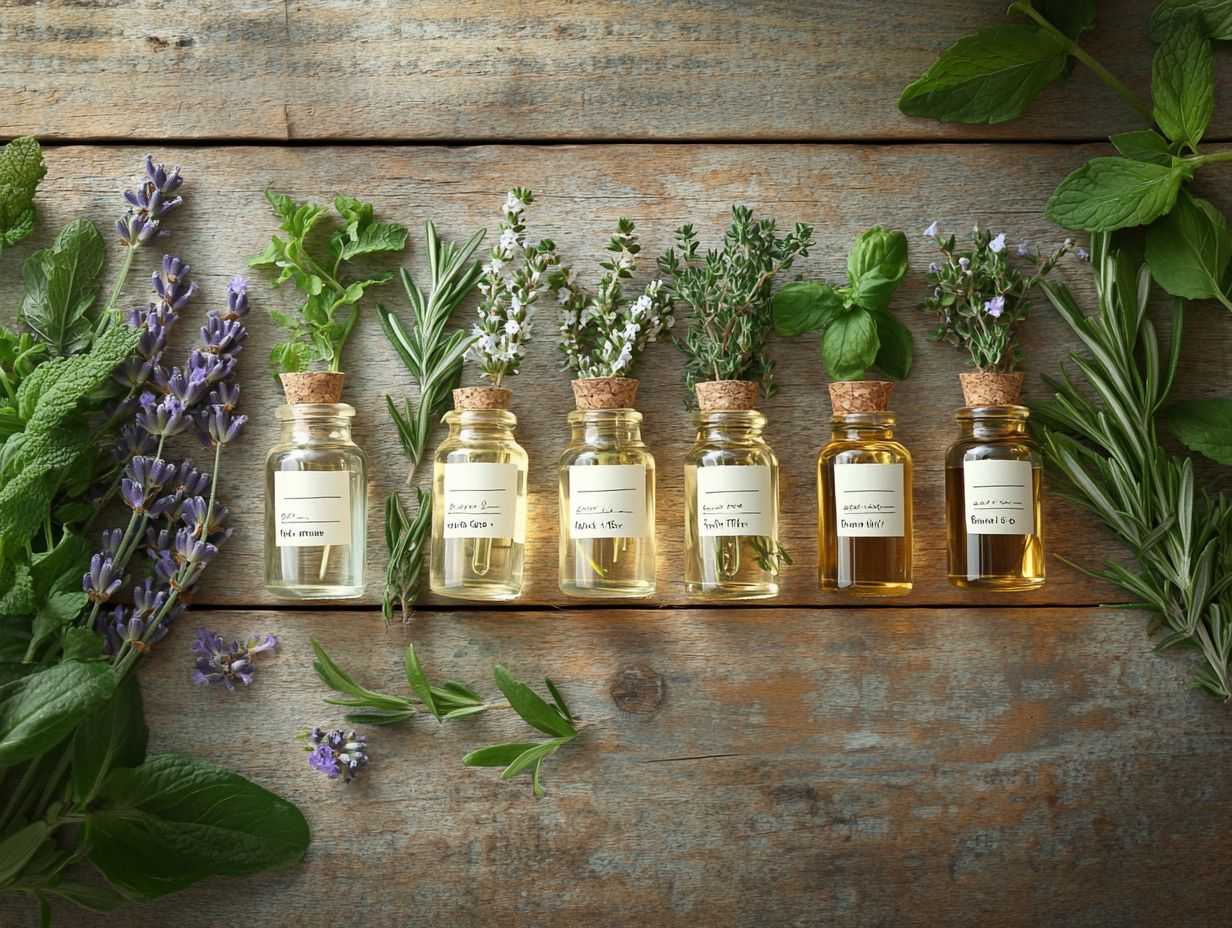
Despite their popularity, many myths about essential oils can mislead you, especially regarding their health benefits and the safety standards that govern their use.
You might hear that essential oils can cure serious medical conditions, but the scientific evidence often doesn t back such claims. There s a misconception that all essential oils are safe to use undiluted or that they re perfectly fine to use around children and pets. This highlights the importance of proper education; understanding safety standards and appropriate usage can significantly reduce the risk of potential toxicity.
You need to know that while essential oils can be beneficial, they require care and knowledge to ensure safe and effective use.
What Are the Different Methods of Extracting Essential Oils from Herbs?
You can employ various methods to extract essential oils from herbs, including steam distillation, solvent extraction, and the distillation process. Each of these methods influences the quality and chemical composition of the resulting oil.
Each technique works differently to separate the essential compounds, affecting fragrance and health benefits. For example, steam distillation uses boiling water to vaporize the essential oils before condensing them back into liquid form. On the other hand, solvent extraction uses chemicals to pull out the oils, which are then evaporated. However, this process can potentially alter the purity of the oil.
You should conduct chemical analysis to assess the quality of the extracted oil, ensuring it meets specific standards. Therefore, choosing the most suitable extraction technique based on the type of herb and the desired oil properties is essential for maximizing effectiveness.
What Are Some Other Essential Oils Derived from Herbs?
Along with lavender and peppermint, you can explore many essential oils from herbs like clove and citrus oils. Each of these oils offers various therapeutic benefits and can also be used in cooking.
Tea tree oil is known for its strong antiseptic properties. It’s great for treating acne and healing wounds.
Rosemary oil has an uplifting scent that can improve focus and memory. This makes it a favorite in aromatherapy.
Eucalyptus oil helps with breathing issues. It can relieve coughs and congestion when used in a diffuser or during steam inhalation.
Always remember that some people may have skin sensitivities to these oils. Proper dilution and patch testing are smart practices for a safe experience.
How Can Essential Oils Be Used in Natural Cleaning and Skincare Products?
Essential oils can boost your natural cleaning and skincare products. They provide therapeutic benefits but can cause skin irritation if not diluted properly.
To use essential oils like tea tree, lavender, and eucalyptus effectively, knowing how to use them is key. For example, tea tree oil is excellent for homemade cleaners due to its antibacterial qualities.
When mixing it with vinegar and water, follow the dilution ratio of one part oil to ten parts liquid. This ensures safety and effectiveness.
Lavender oil enhances skincare routines and adds soothing benefits to moisturizers or lotions. Be aware of your skin type and any potential allergies when using these oils.
What Are Some Tips for Choosing High-Quality Essential Oils?
Choosing high-quality essential oils is vital for safety and effectiveness. Look for purity, clear labeling, and safe extraction methods.
Opt for oils that are certified organic or have reputable certifications. These labels indicate adherence to quality standards.
Understanding extraction methods like steam distillation, cold pressing, or CO2 extraction helps you know how the oil was made. This knowledge impacts the oil’s quality.
Check chemical analysis reports from suppliers. These can confirm the oil s purity and composition, ensuring you choose a safe and effective product.
Are There Any Side Effects of Using Essential Oils?
Essential oils offer many benefits, but be aware of potential side effects like skin irritation or allergic reactions. Understanding proper usage minimizes these risks.
Before using a new essential oil, do a patch test to check for reactions. This simple step can prevent larger issues later.
Follow manufacturer guidelines for dilution. Using oils without proper dilution can lead to complications, and some may interact with medications.
By using essential oils wisely, you can enjoy their therapeutic properties while protecting your health.
What Are Some Ways to Store and Preserve Essential Oils?
Proper storage and preservation of essential oils are essential for ensuring their effectiveness and extending their shelf life. To achieve this, keep them in dark glass bottles safely tucked away from sunlight and heat.
Storing these oils in a cool, dry place can significantly prevent degradation and protect their natural chemicals that give essential oils their unique scents and benefits. It’s wise to steer clear of areas with temperature fluctuations, like those near stoves or windows.
Minimizing exposure to light, heat, and moisture helps maintain the therapeutic qualities of your oils for an extended period. Using tightly sealed containers prevents oxidation and evaporation, ensuring that every precious drop retains its beneficial properties.
Follow these tips to fully enjoy the incredible benefits of essential oils!
Frequently Asked Questions
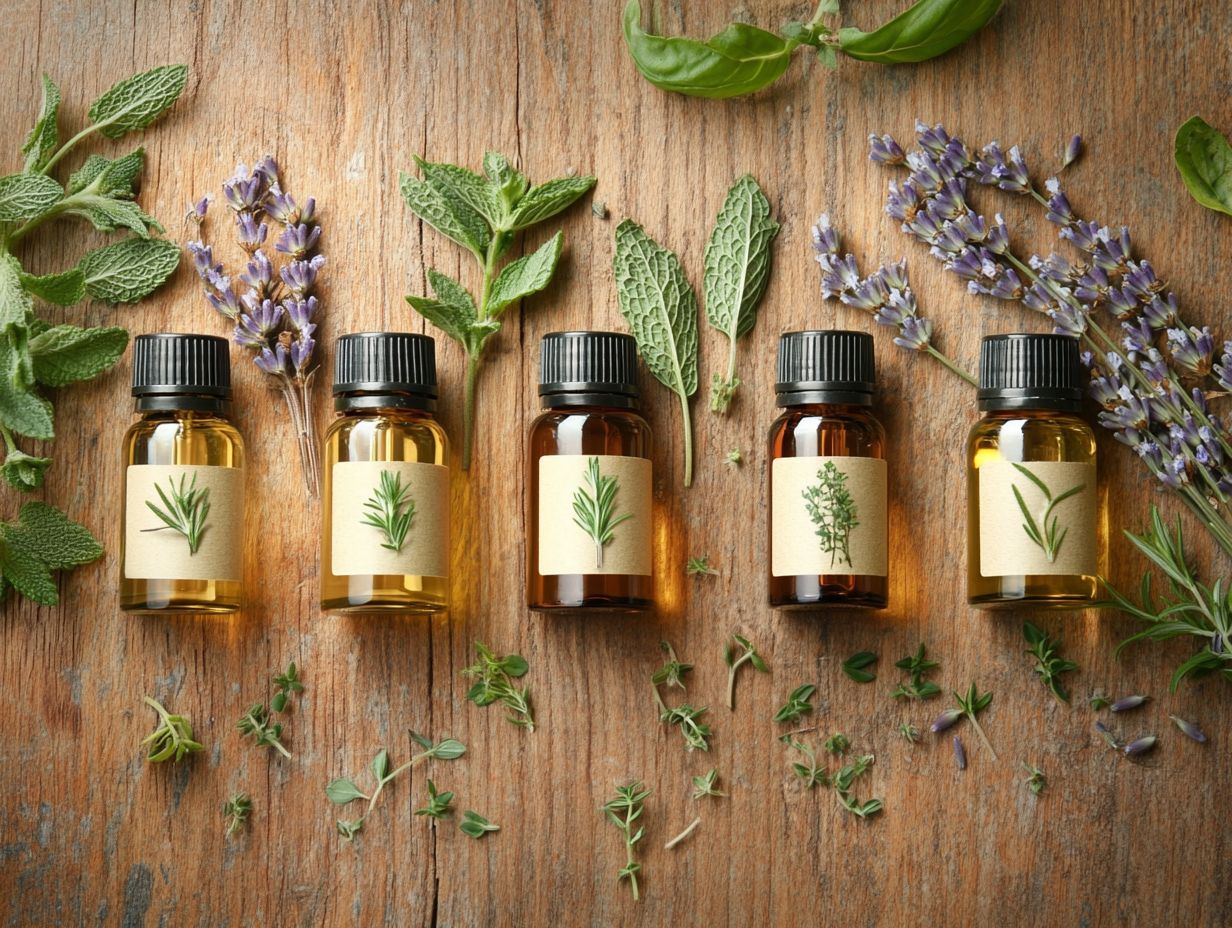
1. What are the benefits of using essential oils derived from herbs?
The benefits of using essential oils derived from herbs include natural healing properties, stress relief, improved sleep, and a boost in overall well-being. You can use these oils in aromatherapy today to uplift your mood and promote relaxation!
2. Which herbs are commonly used to make essential oils?
Some commonly used herbs to make essential oils include lavender, peppermint, eucalyptus, tea tree, and rosemary. For those interested in culinary applications, exploring 5 popular herbs with culinary uses can reveal their strong scents and numerous health benefits.
3. How are essential oils derived from herbs?
Essential oils are typically extracted from herbs through a process called steam distillation. This involves using steam to extract the oils from the plant material, which are then condensed and collected.
4. How can essential oils derived from herbs be used?
Essential oils can be used in a variety of ways, such as topical application, inhalation, and ingestion (although ingestion should only be done under the guidance of a trained professional). They can also be added to bathwater or used in a diffuser for aromatherapy.
5. Are there any safety precautions when using essential oils derived from herbs?
Yes, it is important to always dilute essential oils before applying them to the skin and to perform a patch test beforehand to check for any potential allergies. It is also recommended to consult a healthcare professional before using any essential oils, especially if you are pregnant or on medication.
6. Can essential oils derived from herbs be harmful?
While essential oils have numerous health benefits, they can also be harmful if not used properly. Always follow recommended dilution and usage guidelines and be aware of any potential allergies or sensitivities. If any adverse reactions occur, discontinue use immediately and seek medical attention if needed.



